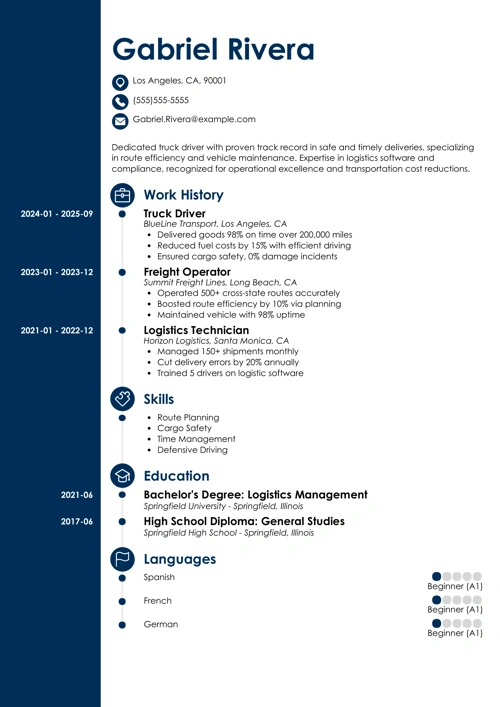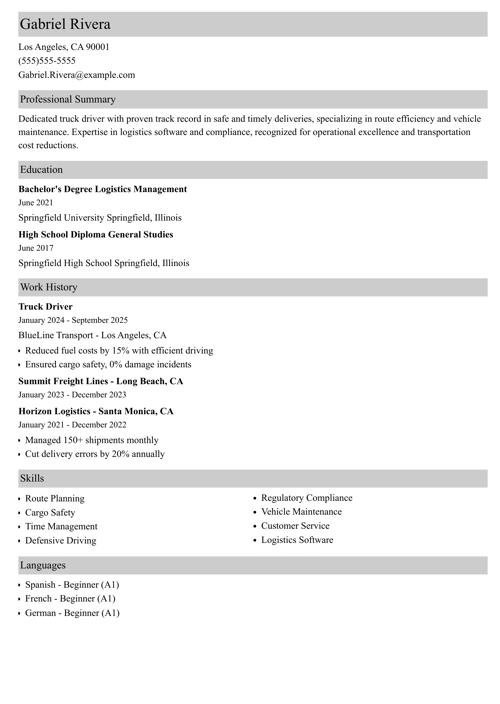Employers are literally fighting for candidates with highly developed problem-solving skills. Are there really such few people who've mastered the art of problem-solving? Or do others need to present their problem-solving skills on their resumes more convincingly?
If you want to discover the best problem-solving skills examples, how to highlight them on your resume, and how to improve your problem-solving skills—you're exactly where you need to be.
This article will show you:
- What are problem-solving skills and why you need them.
- How to list problem-solving skills on a resume.
- Problem-solving skills examples for various professions.
- How to improve problem-solving skills in your free time.
Want to save time and have your resume ready in 5 minutes? Try our resume builder. It’s fast and easy to use. Plus, you’ll get ready-made content to add with one click. See 20+ resume templates and create your resume here.
Sample resume made with our builder—See more resume examples here.
Looking for information on other skills? Head straight to one of our guides:
- 99 Key Skills for a Resume
- Organizational Skills
- Project Management Skills
- Marketing Skills
- Creative Thinking Skills
- Collaboration Skills
What Are Problem-Solving Skills?
Problem-solving skills consist of a set of abilities that help you identify a problem, propose solutions, choose the best one, and implement it. Problem-solving combines a bunch of other skills, such as critical thinking, decision-making, and information analysis. It's a valued skill in many jobs.
Which skills should you put on your resume? Read more: Professional Skills for a Resume (The Best Examples)
Why Are Problem-Solving Skills Important?
Studies invariably place problem-solving somewhere at the top of lists of skills in high demand among hiring managers. What’s more, finding a job offer that doesn’t mention problem-solving skills as part of the employer’s requirements is hard.
Other research shows that of all employability skills, problem-solving skills are the ones that managers find insufficiently developed among the staff. This is because employees are often afraid that the solutions they propose will lead to the problem... becoming worse.
This is why candidates and employees with highly developed problem-solving skills are so desirable.
Read more: What to Put on a Resume?
7 Examples of Essential Problem-Solving Skills
Here’s a list of key skills that may be useful at each stage of the problem-solving process:
1. Analytical Skills
This is pretty self-explanatory. To solve a problem, you must be able to analyze it from a couple of angles. Your analytical skills are exactly what you need to propose solutions and get to the heart of the matter.
2. Research Skills
As a matter of fact, they tie in nicely with your analytical skills. You must be able to find and use the right resources, dig deep enough to extract the data you need, and find the right people to bounce your ideas off of. Research skills are an essential component of the problem-solving skill set.
3. Creativity
Sometimes, finding the right solution will require you to step out of your comfort zone, think outside the box, and push the envelope. This is only possible when your creative thinking skills are as sharp as razors.
4. Decision-Making Skills
Once you narrow down your choices and pinpoint what causes the problem, you must make the right decision. Remember: you’ll be held accountable for what you decide upon. A bad decision may not help find a solution in the best-case scenario, or may aggravate the problem in the worst case.
5. Critical-Thinking Skills
The art of problem-solving is correlated with your ability to think critically. If you have problems with seeing the big picture, you won’t be able to identify all the pros and cons of different avenues you might decide to take.
6. Collaboration
Rarely is problem-solving a solitary task, especially in the business context. You need to prove you work effectively as part of the team to implement your solutions.
7. Communication Skills
Last but definitely not least. No problem would ever be solved if it weren’t communicated effectively. Period. The importance of good communication skills can never be underestimated. All problem-solving strategies depend on successful communication.
As you can see, problem-solving is related to many other kinds of skill sets. That's because it takes a mastery of more than one skill to solve a problem. Recent studies on employability skills suggest that problem-solving skills consist of two main components:
- identifying the problem,
- deciding on the best solution.
Each of these is as important as the other.
The problem-solving process involves analyzing the situation, understanding it, and coming up with an action plan. In fact, you can develop several possible action plans based on your assumptions about the root cause. This is when decision-making skills come in handy.
If you understand the situation well and its implications, you can decide on the right course of action more effectively and efficiently. So, when you come to think of it, there’s no such thing as a single problem-solving skill.
Not sure which strengths to highlight on your resume? Read our guide: 30+ Key Strengths for a Resume (+ Examples)
How to List Problem-Solving Skills on a Resume?
Let's take a closer look at how to highlight your problem-solving skills on a resume. There’s a good strategy that always works. It’s called: tailoring your resume to the job description.
1. Analyze the Job Description
Many jobs require your problem-solving skills to be second to none. The job ads for such positions include entire lists of problem-solving skills that recruiters want to see on your resume. You just need to scan them for relevant keywords.
Here’s an example of a job description for the position of a business analyst:
- Collaborate with solution architects to develop solution designs, and developers to ensure solutions meet the business requirements.
- Establish high-quality user requirements and functional requirements on the basis of identified business needs.
- Evaluate information gathered from multiple sources, reconciling conflicts, and decomposing high-level information into details. Abstracting up from low-level information to a general understanding.
- Distinguishing user requests from the underlying true needs.
- Create work effort estimations.
- Support testing process on projects to ensure the solution is fit for purpose.
- Responsible for ensuring that the final solution matches the URS and meets the customer's needs.
By the look of it, you can easily say that a business analyst is a professional problem solver.
Before we move on, you need to know one thing: Almost all big companies use the ATS (Applicant Tracking System) to initially screen resumes for keywords. If your resume doesn’t contain the problem-solving keywords the ATS is looking for, you will likely end up in the rejected folder. To avoid this, you need to use the resume keywords from the job ad in your own job description.
2. Highlight Problem-Solving Skills in Your Resume’s Work Experience Section
Once you include relevant examples of your problem-solving skills, the experience section of your resume could read something like this:
Problem-Solving Skills on a Resume—Example
- Developed solution designs in collaboration with software architects that improved process efficiency by 150% and reduced costs by $300K.
- Supported testing on 3+ large-scale projects to refine solutions and ensure they fit the purpose and match the customer’s needs. This resulted in $1M savings for the client.
This way, you can be sure that:
- the relevant keywords are there,
- you’ve included the problem-solving skills the hiring manager is after.
Pro Tip: Describe your past duties and responsibilities in terms of professional achievements.
3. List Your Problem-Solving Skills in a Separate Resume Section
You can list problem-solving skills on a resume in a separate section to make them even more visible. But don’t put any random soft skills there.
Take another look at your job description, extract the essence, and use some problem-solving skills synonyms to introduce a bit of variety to your resume. Take a look at the sample resume section below:
Examples of Problem-Solving Skills for a Resume
- Data analysis
- Process analysis
- Project design
- Solution design
- Test development
- Benchmark development
- Troubleshooting
- Collaboration
The problem-solving skills list above is entirely based on the two aforementioned experience bullet points.
The best part?
If the recruiter decides to ask you situational questions related to any of the skills on the list, you can answer them by referring to a bullet point in your experience section. So if you hear something like: Tell me about a situation when your data analysis and solution design skills made a difference, you can focus on telling the recruiter what steps you took specifically to improve process efficiency by 150% and reduce costs by $300K.
4. Weave Problem-Solving Into Your Resume Profile
There’s one more section on your resume you might want to populate with some of your problem-solving skills. The resume objective or resume summary.
Here’s what it could look like:
Problem-Solving on a Resume: Example of a Resume Summary
A senior business analyst with 7+ years of experience and excellent communication skills. Eager to join Genentech to support solution lifecycle management and participate in executing strategic initiatives. In previous roles, identified a major bottleneck generating a $200K monthly revenue loss and designed a solution to prevent it effectively.
As you can see in this example, you can call your problem-solving skills by name and put them at the very top of your resume.
Read more: How to Write a Professional Resume Profile?
The Best Problem-Solving Skills for a Resume
Need more ideas? Here’s a list of keywords you may find useful when wondering how to describe your problem-solving skills on a resume:
- Analyzing
- Brainstorming
- Critical thinking
- Decision making
- Designing
- Drawing conclusions
- Experimenting
- Focus
- Innovation
- Insight
- Listening skills
- Logical reasoning
- Negotiation
- Observation
- Organizational Skills
- Persistence
- Persuasion
- Questioning
- Scheduling
- Testing
Not sure what’s the difference between hard and soft skills? Read more: Hard Skills vs Soft Skills [+Examples]
Making a resume with our builder is incredibly simple. Follow our step-by-step guide, use ready-made content tailored to your job and have a resume ready in minutes.
When you’re done, Zety’s resume builder will score your resume and our ATS resume checker will tell you exactly how to make it better.
How to Improve Problem-Solving Skills
Problem-solving skills are vital. Studies show that if we come up with the wrong solutions, we may unknowingly aggravate the problems in the long run.
If you're wondering how to improve your problem-solving skills—The answer is simple. Practice makes perfect. But not just any practice. Here's what you need to do:
1. Understand the Problem
Analyzing and fully understanding the problem you’re facing is more important than you may think. Truly understanding a particular challenge makes it much more likely to develop more potential solutions in less time.
2. Clarify the Key Components of the Problem
Once you’ve understood the problem in detail, try to identify its key elements. Dividing the problem into a few smaller parts not only makes it feel less intimidating but also easier to come up with strategies for how to manage it.
3. Explore Various Potential Solutions
An ideal solution to a problem is both simple and effective. To pick the best one, first come up with a few different ones. Don’t be afraid to brainstorm various strategies and explore even the not-so-obvious ideas. Let your creativity take charge!
4. Take Action to Address the Problem
Once you’ve picked the best solution, implement it by taking action. If the problem at hand is more complex, write down a plan before you start acting on it.
5. Reflect on the Experience and Extract Valuable Lessons From It
To truly improve your problem-solving skills, don’t forget about looking back on the entire process. Focus on what you’ve learned and what you can do better when faced with challenges in the future.
Curious how to add skills to your LinkedIn profile? Read more: The Best Skills to Add to LinkedIn (List + How To)
Plus, a great cover letter that matches your resume will give you an advantage over other candidates. You can write it in our cover letter builder here. Here's what it may look like:
See more cover letter templates and start writing.
Key Takeaways
Here’s a quick summary of all you need to remember about problem-solving skills:
- Problem-solving skills are one of the key employability factors, as identified by several independent studies. Employers look for candidates with good problem-solving skills.
- They consist of a set of interrelated abilities that allow you to solve problems effectively.
- You can show your problem-solving skills on a resume in many ways. Just make sure you identify the relevant ones.
- The best way to improve your problem-solving skills is by approaching problems in a methodical way. Practice makes perfect!
About Zety’s Editorial Process
This article has been reviewed by our editorial team to make sure it follows Zety's editorial guidelines. We’re committed to sharing our expertise and giving you trustworthy career advice tailored to your needs. High-quality content is what brings over 40 million readers to our site every year. But we don't stop there. Our team conducts original research to understand the job market better, and we pride ourselves on being quoted by top universities and prime media outlets from around the world.
Sources
- The Soft Skills Job Seekers Need Now | ICIMS
- S. Dench et al., Employers' Perceptions of Key Skills
- I Made Suarta et al., Employability skills required by the 21st-century workplace: a literature review of labour market demand
- George Polya, How to Solve It: A New Aspect of Mathematical Method (Princeton Science Library)





